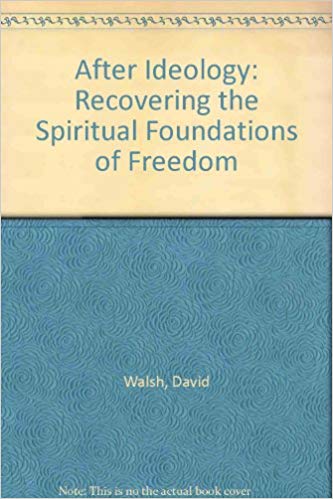This is an important and optimistic book, and the fact that it has been published by a major secular publishing house perhaps bears out the author’s thesis that Western culture is ripe for a major spiritual revival.
On one level, After Ideology is another statement of the now familiar “bankruptcy of secular liberalism” idea that has been current for a long time. David Walsh, who is a professor of political thought at the Catholic University of America, argues persuasively that liberalism, by weakening the moral basis of humanity, has undercut its own foundation. Liberalism asserts an expanding list of personal “rights” without being able to state why such rights are important, and whence they derive. At the same time as it attempts to expand the scope of “human dignity,” liberalism also moves with equal determination to deny or “demythologize” traditional beliefs about the spiritual nature of humanity, which alone make that dignity possible.
In Walsh’s view, the gap between democratic liberalism and totalitarianism is by no means as wide as is conventionally thought, since both deny fundamental spiritual reality. But Walsh thinks that most statements of this dilemma, such as Alasdair MacIntyre’s After Virtue, fall short because they make merely theoretical statements of the problem, asserting premises that do not persuade the skeptic. What is needed now is a breakthrough to a “primal existential experience” that will reveal these truths in a new and powerful way. Walsh is emphatically not granting experience itself the ultimate authority. He argues for an act of faith in “traditional symbols,” including theological doctrines, but also for an attempt to penetrate to the formative experience that first brought those symbols into being. Fyodor Dostoyevsky’s last-minute reprieve on the scaffold and Aleksandr Solzhenitsyn’s life in the gulag are, he believes, prime instances of such experiences. Dostoyevsky and Solzhenitsyn are, of course, Russian Christians, but Walsh also considers the agnostic (atheist?) Albert Camus and the religiously ambivalent Eric Voegelin, in particular showing how Camus’ existentialism led to a confrontation with the ultimate religious questions, and to a revelation of the final absurdity of purely secular answers.
Inevitably, Walsh makes much of the collapse of secular utopianism in our time, and thus by implication of all ideologies of complete human autonomy and self-fulfillment. What is needed now is a “catharsis” from modernity, in which errors recognized as such at the intellectual level are purged from the Western soul. Some of the argument is at least questionable in its historical dimension, especially the attempt to trace modern utopianism to Renaissance humanism. On the whole, however, it is a powerful and compelling book. Its chief weakness, ironically, may be that it necessarily partakes of that same abstract quality that Walsh criticizes in thinkers like MacIntyre.
For modernity as it now exists cannot be treated simply as a derivation from a series of major thinkers such as Marx and Nietzsche. Popular culture, possessing at best only a very indirect relationship to philosophy, now has a life of its own to a degree that was perhaps never true at any time in the past. Spiro Agnew spoke of the “silent majority,” and as late as about 1970 it was still possible to regard popular culture as essentially conservative, a bulwark of resistance to intellectual and moral changes fostered by various elites. That is no longer the case and, to the degree that intellectuals sober up and contemplate the loss of spiritual rootedness, they may find that “the masses” have little interest in, or sympathy with, such a revival.
What modern culture has finally spawned—through schools, churches, mass media, and corporations—is a rootless hedonism that validates itself on the basis of nothing more than immediate experience and that owes little to any Utopian vision. In many ways this culture is apolitical and observes the collapse of communism with merely detached approval; the next stage of history, according to this view, being simply the extension of the benefits of the hedonistic society to those peoples hitherto ground under the totalitarian heel.
Thus far there appears to be only one effective way by which people experience a “catharsis” that enables them to turn away from hedonism and reestablish contact with the “existential experience” underlying traditional symbols, and this is personal, evangelical, religious conversion—a conversion that is sometimes profound, and other times from the viewpoint of both traditional religion and traditional philosophy, sentimental. It is significant that Walsh, though a professor at a Catholic university, does not teach theology. While one might suppose that theologians, distressed by the religious aridity of modern culture, would be the people most inclined to search eagerly for signs of a fundamental cultural shift, in truth most working theologians have an ideological stake in the cultural conditions that Walsh deplores—a fact that has much to say about the nature of the coming spiritual revival, or even whether there is to be one.
But no author should be faulted for the book he did not write, and we should be grateful to David Walsh for diagnosing the disease and suggesting possibilities for its cure with unusual profundity and clarity.
[After Ideology: Recovering the Spiritual Foundations of Freedom, by David Walsh (San Francisco: HarperSanFrancisco) 296 pp., $29.95]

Leave a Reply